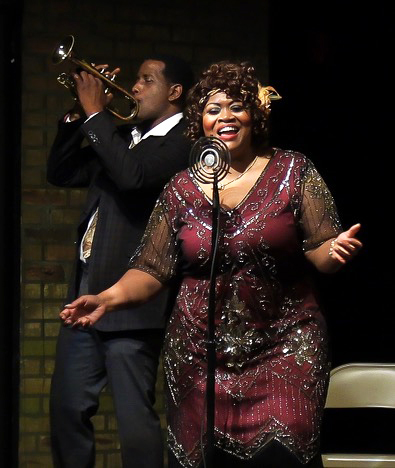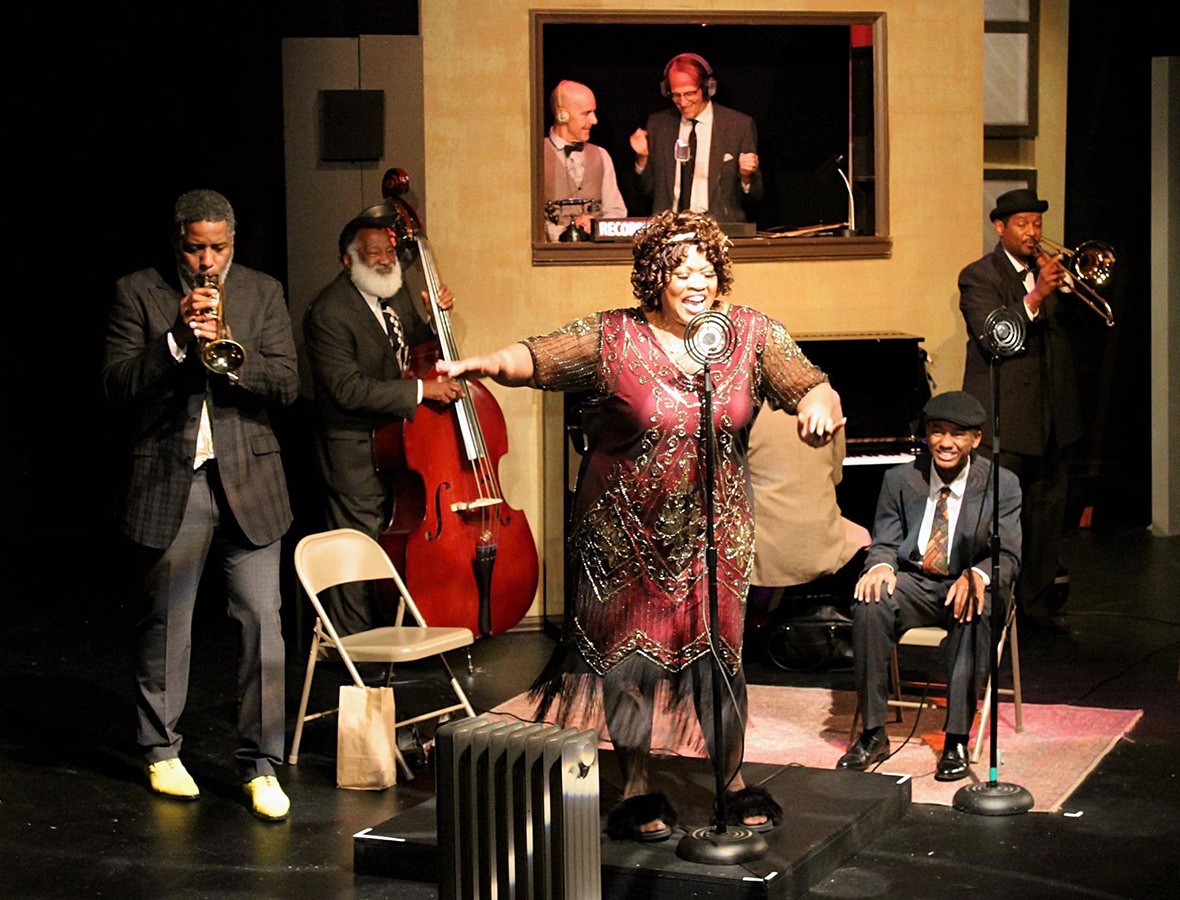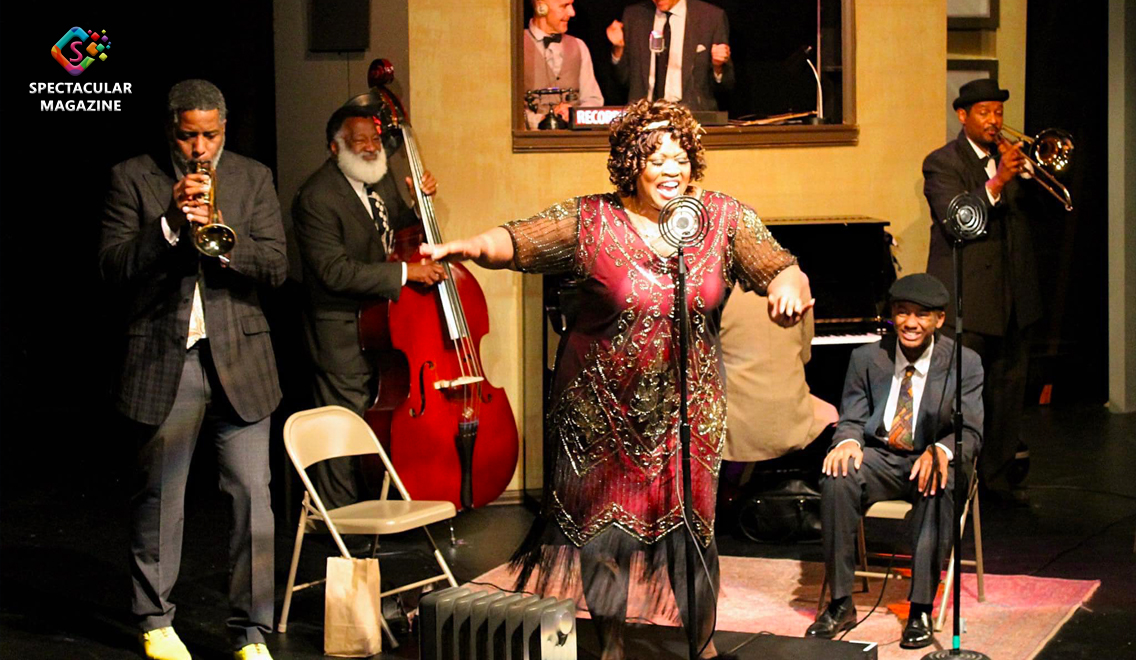Emelia Cowans In Pure Life Theatre’s “Ma Rainey’s Black Bottom”: Powerful! (4/5 Stars)
RALEIGH – Music has been a staple throughout the Black community, from jazz to rock and roll and the blues. “Ma Rainey’s Black Bottom,” presented by Pure Life Theatre Company, highlights special unity, generational differences, racial exploitation, and the struggles of being a person of color.

In “Ma Rainey’s Black Bottom,” the audience goes to 1920s Chicago to meet Ma Rainey or Ma (Emelia “MeMe” Cowans), a blues singer referred to as the “Mother of Blues” throughout the play. Her band is made up of four Black musicians.
Toledo (Thomas McDónald), a philosopher and avid book reader, is the pianist. Culter (TJ Swann) is the God-fearing reefer-smoking trombone player. Slow Drag (Warren Keyes) plays the bass for Ma, getting his nickname from some wild adventures. The trumpet player Levee (Ajani Kambón) tends to be the outcast of the group, going against Ma and wanting someday to make a band of his own. Something the older members of the band find hysterical.
The set is simplistic, with the recording studio and band room sharing the stage with little design. It was enough to know the setting along with the lighting, telling the audience which place on the stage to focus on. Besides, the set is only part of the entire show.

Ma’s manager Irving (Larry Evans), producer Sturdyvant (Thom Hayes), and Ma (Emilia Cowans) argue back and forth about punctuality, recording, and pay for nephew Sylvester (Quinn Michael Gray), a boy with a stutter but was still able to help record a song. Dussie Mae (Moariah Renee Williams), a woman traveling with Ma, is always ready to support her by her side whenever she threatens to walk out on her manager and producer. She also romantically supports bandmate Levee (Ajani Kambón) behind Ma’s back.
The play’s themes do not discuss anything that is not relevant today. Ma was realistic, knowing that her manager only wanted her for her voice, not because he cared about her. The same labor exploitation, specifically with people of color, still exists. However, Ma would not let that happen to her and refused to bend to their will.
The generational and racial difference between being satisfied with what you have exists today. Whether young people or people of color should be satisfied with what they have. Levee, the youngest of the group, kept wanting more independence and being free of just playing for Ma. The others could not see his point, saying he should be grateful to play at all.
Toledo (Thomas McDónald) also helped to ask the philosophic questions to the audience. Have Black people bent to the will of white people over the course of slavery and forgotten who they are? Could it even be people of color somehow helping to keep themselves down by not doing their share to help?
 The play ends on a note of aggression, tension, and dread. “Ma Rainey’s Black Bottom” will make you laugh, but it will also transport you to 100 years ago and make you think about our advancements and how we still have some of the same issues. As Toledo said, everyone has to do their part; no one person of color can solve racial inequality by themselves.
The play ends on a note of aggression, tension, and dread. “Ma Rainey’s Black Bottom” will make you laugh, but it will also transport you to 100 years ago and make you think about our advancements and how we still have some of the same issues. As Toledo said, everyone has to do their part; no one person of color can solve racial inequality by themselves.
“Ma Rainey’s Black Bottom” has the ability to make you laugh, grow upset, and ask questions you may never think of. It is not a play for children, but it is a play to help give you insight into the Black experience in America that may start out a little slow but has you entranced by the end of the first Act. Emelia Cowans delivered a powerful performance as a strong leader with a strong voice (literally and figuratively). The play is a solid 4 out of 5 stars.
“Ma Rainey’s Black Bottom” is playing at the Leggett Theatre (15 E. Peace Street) on the campus of William Peace University from September 21 – 24. For tickets, click here.
Feature Image Credit: Tiffani Staten



